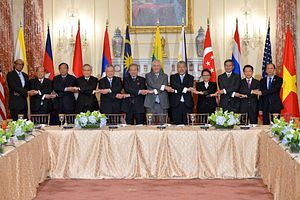The pivot is dead and Southeast Asia knows it.
A recent online survey of regional experts conducted by the ISEAS-Yusof Ishak Institute’s ASEAN Studies Center in Singapore depicts a dim view of the Donald J. Trump administration. It’s uncertain if outreach efforts, such as Secretary of State Rex Tillerson’s meeting with ASEAN foreign ministers and senior officials last week, can repair the damage to U.S-ASEAN relations the surveyed experts — academics, think tankers, government officials, and members of civil society and non-governmental organizations — perceive.
A significant 69.8 percent of those surveyed agree or strongly agree that Southeast Asia is more stable with active U.S. engagement. Views as to whether the administration was interested in the region were split — with 43.3 percent saying the Trump administration wasn’t interested, 37 percent saying it was interested, and 5.4 percent that the administration was highly interested. Most expect a decrease (43.3 percent) or substantial decrease (13 percent) in U.S. engagement with the region.
While most foresee a decrease in U.S. regional engagement, there was one area where the surveyed experts believe Washington will pay attention: the South China Sea. While 45.9 percent disagreed with the statement that “The U.S. can be relied on to uphold free trade, human rights and international law in the region,” 53.3 percent agreed that “The U.S. will uphold freedom of navigation in the South China Sea.”
Regional anxieties about the South China Sea — where several ASEAN members have competing territorial claims — are driven by the figure of a looming China. About 74 percent of those surveyed said China was the most influential country in the region and a similar number said China would be the most influential country over the next decade. And overwhelming majority (80.2 percent) of the survey respondents said China would fill the gap created by a possible “strategic vacuum” stemming from U.S. regional indifference.
Last week, after Tillerson’s meetings with the ASEAN foreign ministers, a State Department spokesperson, Heather Nauert, said the secretary had “underscored that the Asia-Pacific region is a top priority for the Trump Administration and that ASEAN is an essential partner.”
But saying the region is a top priority is one thing; proving it to policymakers and elites in the region is a different matter. As my colleague Prashanth Parameswaran noted last month, attendance at the two major Asian summits in November — the Asia-Pacific Economic Cooperation (APEC) Summit in Vietnam and the East Asia Summit (EAS) in the Philippines — is seen as an early litmus test of the administration’s Asia strategy. Parameswaran made the case as to why Trump should attend in early April and a few weeks later, Vice President Mike Pence visited Indonesia during his Asia tour.
In Jakarta, Pence said the president had told him he would be attending both summits, though it remains to be seen whether this will actually be the case. Regardless, experts surveyed by the ASEAN Centre were not completely convinced: 37.7 percent said he was “likely” to attend while 32 percent said he was “unlikely” to attend. The survey was run from April 10 to 23, meaning that at least some of the later respondents may have been factoring in Pence’s April 20 statement that Trump would be going to the November summits.
If Trump does attend, he has a seemingly uphill perception battle in a region that sees the United States as having lost position relative to China. 51.4 percent of the survey’s respondents agreed that the United States had lost strategic ground to China since Trump’s inauguration.
On a more global scale, nearly 72 percent of respondents said the United States’ global image had deteriorated (46.3) or deteriorated immensely (25.4) since Trump took office in January.
According to VOA, the head of the center, Dr. Tang Siew Mun, wrote in an email that the “degree and intensity” of the negative perceptions displayed by the survey were surprising, but they should be viewed as a call for greater engagement. The survey, Tang explained, “is a strong statement of the region’s disappointment in the disinterest shown by the Trump administration. This is not a clarion call of ‘Yankee go home!’ Quite the opposite.”
































